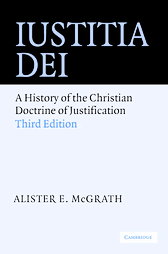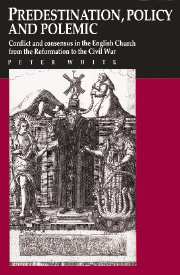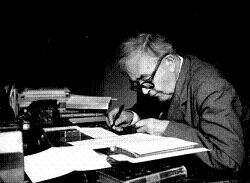Showing posts with label Calvinism. Show all posts
Showing posts with label Calvinism. Show all posts
Sunday, May 19, 2013
Theodicy and Determinism: Leibniz's Folly of the "Best Possible World"
The theodicy conundrum is typically set up as a "best possible worlds" dilemma: of all possible worlds that could have been created, why would an all-loving, all-knowing, and all-powerful God create a world in which evil and suffering exist? Why did God create the circumstances that would allow Adam to sin? These questions, the stuff of anti-theist rejoinders, have been the perennial bane of Christ theology for time immemorial.
Read the Article here.
Labels:
Arminianism,
Calvinism,
Determinism,
Election,
Eternity,
Platonism,
Theodicy
Friday, July 27, 2007
Inspired by Barth: My Bullets on Election
Bobby Kennedy probably didn't intend to start a meme, but here's my bullet point contribution to the topic of election:
· The decree of election is God’s eternal (i.e., ever-present) will to give himself in the incarnation of his Son, Jesus Christ.
· Christ is both the Subject and the Object of election. As Son of God, he is, along with the Father and the Spirit, the electing God. As Son of Man, he is also elected Man; albeit not merely as one elected man, but as the One in whom all others are elected.
· Christ is the all-inclusive election in which we see what election truly is – the unmerited acceptance of humankind by grace.
· The will of the Triune God in electing the Son of Man is the will of God to give himself to humankind in the incarnation of His Son.
· This self-giving is two-fold, both positive and negative (hence, a “double predestination,” if you will). Negatively, God elected himself in Christ to be our covenant-partner, and, as such, bore our merited rejection in his passion and death. Positively, God elected humanity in Christ to be his covenant-partner, and, as such, we are taken up into his glory in his resurrection and ascension.
· Reprobation and election are not two kinds of predestination based on two separate decrees. Rather reprobation and election are the two sides of the same eternal decree of predestination. Reprobation is Christ’s rejection for us that we in turn might not be rejected.
· The election of Jesus Christ includes the election of humankind. This does not mean primarily the election of individuals, but rather the election of the whole of humankind, which is manifested in history in the divine calling of the Church, the elect community, the Body of Christ.
· The Church, the community of the elect, stands in a mediate and mediating role as witness to the truth of God’s will for humankind in Christ. In this way, the elect community mirrors the one Mediator, Jesus Christ.
· The gospel is the declaration of the individual’s election in Jesus Christ, i.e., that Christ bore our merited rejection and gives to us his own glory.
· Individuals begin to live as elect by the event and decision of receiving the promise of Christ as mediated through the witness of, and by inclusion in, the elect community via baptism.
· Those who do not receive the promise of God in Christ live as those rejected in spite of their acceptance (i.e., their election in Christ).
· The relation of free will and grace in predestination is a mystery, yet those who continue to live in the reality of their union in Christ (i.e., those who persevere) are those chosen in Christ before the foundation of the world.
Thursday, July 26, 2007
Bobby Kennedy's Musings on Election

I cruised over to In Hoc Signo Vinces to see what Anglo-Catholic blogger Bobby Kennedy was up to. His recent musings on election (with lengthy caption from the 2nd Council of Orange) is quite insightful. Read the whole article here. What follows is his bulleted list.
++++++++++
If I had to create a bulleted list today of what I affirm concerning election then it would include the following points, in no particular order. This is also not exhaustive.
--Election is corporate and concerns a holy people, a covenant community, and not primarily individuals.
--Election of the covenant community is accomplished through its connection to Christ via a sacramental and ecclesiological framework.
--Baptism is the means by which individuals enter the covenant community of the elect.
--Election of the covenant community entails God’s missionary efforts to redeem the remainder of humanity.
--The covenant community is an eschatological community which prefigures the age to come in the here and now.
--Election does not create a class of the elite but rather a class of servants.
--Any pre-creation acts of predestination, on the part of God toward his creatures, seems to entail his choice of a bride for his Son, and not of individuals into that bride.
--Foreknowledge seems to be the fore-loving of the covenant community rather than the fore-seeing of who would ultimately compose such a community.
--Salvation is dependent upon one’s continual perseverance in the body of Christ.
--Election is dependent on God’s faithfulness, and thus we have the best grounds upon which to make our calling and election sure.
Saturday, November 25, 2006
Who wrote the following statement? C'mon, take a guess...
"I recommend that the Commentaries of Calvin be read, whom I extol in higher terms than Helmichius himself, as he owned to me, ever did. For I affirm that in the interpretation of the Scriptures Calvin is incomparable, and that his Commentaries are more to be valued than anything that is handed down to us in the Bibliotheca of the Fathers; so much so, that I concede to him a certain spirit of prophecy in which he stands distinguished above all others, above most, yea above all. His Institutes, so far as respects Commonplaces, I give out to be read after the Catechism, as a more extended explanation. But here I add -- with discrimination, as the writing of all men ought to be read."
Tuesday, November 21, 2006
McGrath on English "Arminianism"

Although there can be little doubt that the Reformed doctrine of election continued to be widely held, particularly within Puritan circles, increasing opposition to the doctrine, largely from academic sources, was evident in the early seventeenth century. Thus Richard Hooker at Oxford, and Launcelot Andrewes at Cambridge, developed an 'Arminianism before Arminius', which received considerable impetus through the influence of William Laud, subsequently translated to Canterbury. Like Vincent of Lerins, Andrewes declined to support the latest continental speculation on predestination precisely because he felt it to be an evident innovation. The Arminianism of the leading divines of the period -- and the intense hostility towards them from Puritans -- is perhaps best illustrated from the controversy surrounding the publication of Henry Hammond's Practical Catechism in 1644. This work may be regarded as a classic statement of the soteriological convictions of the Laudian party, asserting unequivocally that Christ died for all men. This view was variously described by his opponents: Cheynell accused him of subscribing to the doctrine of universal salvation; others charged him with Arminianism. The response of Charles Barksdale to this latter charge is particularly significant:
"You are mistaken when you think the Doctrine of Universall Redemption Arminianisme. It was the Doctrine of the Church of England before Arminius was borne. We learne it out of the old Church-Catechisme. I believe in Iesus Christ, Who hath redeemed mee and all mankind. And the Church hath learned it out of the plaine Scripture, where Christ is the Lamb of God that taketh away the sinnes of the world."
In this, Barksdale must be regarded as substantially correct. The Bezan doctrine of limited atonement was somewhat late in arriving in England, by which time the older Melanchthonian view had become incorporated into the confessional material of the English national church -- such as the catechism of 1549. This evidently poses a nice problem in relation to terminology: should one style men such as Peter Baro (d. 1599) as an 'Arminian avant la lettre', or accept that their teaching was typical of the period before the Arminian controversy brought the matter to a head and a new theological term into existence? Most Anglican divines in the late sixteenth and early seventeenth centuries appear to have based their soteriology on the dialectic between universal redemption and universal salvation, declining to accept the Bezan solution of their Puritan opponents...
--Iustitia Dei, p. 293-294.
Labels:
Arminianism,
Calvinism,
English Reformation,
McGrath
Friday, November 17, 2006
The Influence of the British Commission at the Synod of Dort, 1619

The following excerpt comes from Peter White's definitive work, Predestination, Policy, and Polemic: Conflict and Consensus in the English Church from the Reformation to the Civl War (CUP, 1992), page 198.
+++++++++++++
Even more striking are the British comments on the rejectio errorum under this head [Fifth Head -- Perseverance]. By far the most important was their successful request to exclude from condemnation those who taught that true believers and regenerate ('vere credentes et regenitos') were able to fall from the faith of justification. The reasons they gave merit attention:
We ourselves think that this doctrine is contrary to Holy Scripture, but whether it is expedient to condemn it in these our canons needs great deliberation. On the contrary, it would appearThose powerful arguments were effective, and the canon was dropped. As a corollary, the British also asked for the doctrine that temporary faith differed from justifying and saving faith only in duration not to be rejected by the synod...
1. That Augustine, Prosper and the other Fathers who propounded the doctrine of absolute predestination and who opposed the Pelagians, seem to have conceded that certain of those who are not predestined can attain the state of regeneration and justification. Indeed, they use this very argument as an illustration of the deep mystery of predestination; which cannot be unknown to those who have even a modest acquaintance with their writings [!].
2. That we ought not without grave cause to give offence to the Lutheran churches, who in this matter, it is clear, think differently.
3. That (which is of greater significance) in the Reformed churches themselves, any learned and saintly men who are at one with us in defending absolute predestination, nevertheless think that certain of those who are truly regenerated and justified, are able to fall from that state and to perish and that this happens eventually to all those, whom God has not ordained in the decree of election infallibly to eternal life. Finally we cannot deny that there are some places in Scripture which apparently support this opinion, and which have persuaded learned and pious men, not without a great probability.
Labels:
Anglican,
Arminianism,
Augustine,
Calvinism,
English Reformation,
Reformation,
Soteriology
Monday, April 17, 2006
Summary of Barth's view on Election

The following is taken from old lecture notes of mine for a course I taught some years back at Cranmer House. This section is based on G.W. Bromily’s discussion in Chapter VII of his Introduction to the Theology of Karl Barth (pp. 84-98).
(1) Barth, like Calvin, understood the divine decree of election as eternal and immutable. However, he rejected outright the notion of election as an abstract decretum absolutum in the traditional Augustinian sense, considering such to be implicitly deistic. Rather the decree of election is God’s eternal (i.e., ever-present and active) will; and his eternal will is Jesus Christ. The will of God is known to us in the revelation of Jesus Christ, who is both the subject and the object of election.
(2) Jesus Christ is both the electing God and the elected Man. As Son of God He, along with the Father and the Holy Spirit, is the subject of election. As Son of Man He is also elected Man – the object of election. However, he is this not merely as one elected man but as the One in whom all others are also elected. His is the all-inclusive election in which we see what election always is: the unmerited acceptance of man by grace.
(3) The eternal will of God in the election of Jesus Christ is the will of God to give Himself in the incarnation of His Son. This self-giving has both a negative and a positive side – thus it is a “double predestination.” Negatively, God elected Himself to be man’s covenant-partner and as such he suffered death, bearing man’s merited rejection. Positively, the divine self-offering means that God elected man in Jesus Christ to be his covenant-partner and thus to be taken up into His glory as His witness and Image-bearer.
(4) Election should not be understood as one form of predestination, with reprobation as the other form. Such a view inevitably leads to some form of double predestination doctrine that works against the free grace of the Gospel. Rather, reprobation is viewed in terms of Christ’s rejection for us that we in turn might not be rejected. It is the negative side of predestination, which, like the positive side, has Christ as both its subject and object. In this may be seen that God’s predestination is his will in action, neither an abstraction from this will nor a static result of it (hence avioding the implicit deistic tendencies of the scholastic theologies).
(5) Divine election is primarily that of Jesus Christ but His election includes the election of man. This does not mean merely the election of individuals. Between Jesus Christ and individuals is the elected community, which in its mediate and mediating roles mirrors the one Mediator, Jesus Christ. It is only through this mediating election, by inclusion in the elect community, that individuals are elected in and with Christ’s election.
(6) The gospel declares that the individual is already elected in Jesus Christ, who bore his merited rejection. The individual begins to live as elected by the event and decision of receiving the promise. If he does not receive it, he lives as one rejected in spite of his election. If he does receive it, he now lives that which he is in Jesus Christ by the fact that in Jesus Christ his rejection, too, is rejected, and his election consummated. The task of the elected community is to declare the election of the individual.
Until next time
Subscribe to:
Posts (Atom)

